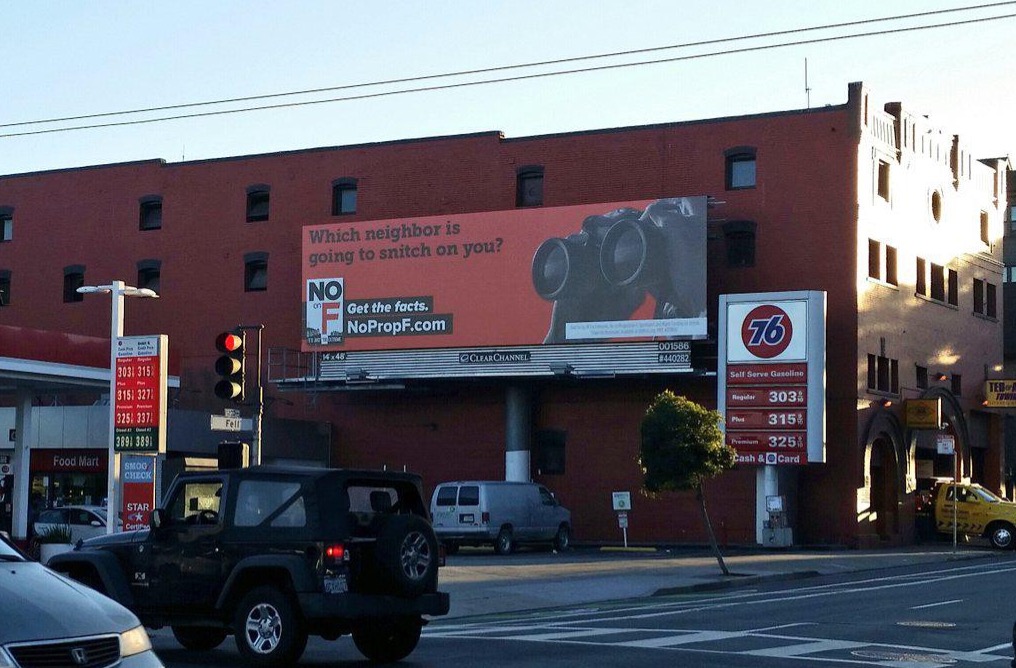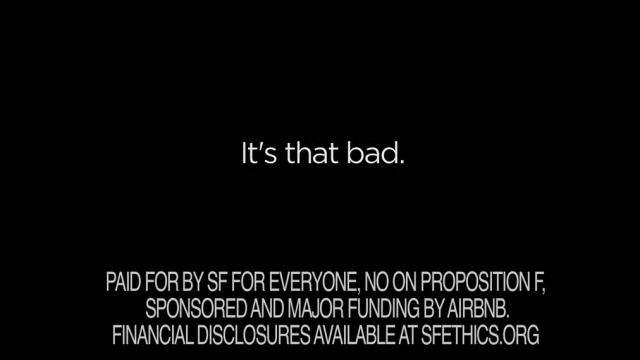This week, San Francisco voters defeated Proposition F, a set of regulations for short-term rentals which many thought might help ease its housing problems. The defeat is being credited almost singlehandedly to Airbnb. Will the entire city of San Francisco become overrun with Airbnb rentals now? Probably not. Have we gotten a taste of what Airbnb will do to win? Yeah — and it’s kinda scary.
The Bay Area’s housing crisis is complicated and the controversial proposition was certainly not a perfect ballot measure to fix it (read Kim-Mai Cutler’s excellent story at TechCrunch for a full explainer). But it would have limited the number of nights hosts could rent their properties, which is the big concern when it comes to a housing shortage which has reached ludicrous levels. The complaint with Airbnb is that a short-term rental unit removed from the long-term housing stock not only takes a potential home away from a local resident, it also costs the city a lot of money.
There would have been some other changes, too: Prop F would have required Airbnb to share quite a bit of data with the city, and fined the crap out of the company if any of its hosts went astray.
Fair? Maybe not totally fair. But the news isn’t that this is some huge victory for Airbnb — the company has had similar incremental wins and losses in cities all over the world — it’s that we now see the full extent to which Airbnb will go to protect itself. The anti-middle class, paranoia-infused rhetoric it created seems to go against everything Airbnb stands for.
Dear Airbnb: if it’s worth $8m to you to beat Prop F, please contribute as much to help build SF affordable housing. pic.twitter.com/hEoWDVQ0er
— Martha Bridegam (@MBridegam) October 21, 2015
Airbnb spent $US8 million to change voter minds. $US8 MILLION. Which is pretty funny since Airbnb ran — and pulled, after heavy criticism — ads that bragged about the $US12 million the company pays annually in hotel taxes, supposedly giving that money “back” to the city. (Their argument: Spending $US8 million to defeat Proposition F helped net the city $US58 million in tax revenue.) This didn’t fly with a lot of people who noted the hypocrisy. Including a group of protesters who stormed Airbnb’s headquarters.
In addition to its horrible ad campaign poking fun at underfunded public services, Airbnb also took a weirdly anti-government stance. In some of its $US8 million in political ads, the company suggested that Prop F would allow San Francisco officials to “spy” on you by making you report where you sleep every night.
Is the city spying on you? Anti Prop F ad paid for by Airbnb
And yet Airbnb has actually created a culture of neighbours snitching on each other — informing landlords when tenants are renting out their apartments, for example — because the company doesn’t require people to disclose that they’re Airbnb hosts. Neighbours are rightly worried about living next to a rotating lineup of guests who are loud or partying (or worse). Airbnb’s campaign also blissfully ignores the legitimate public safety issue here. Residents do have a right to know if their upstairs neighbour isn’t home and if there are strangers in their building instead. It’s irresponsible of Airbnb to make fun of this, as if it were an outrageous thing to want to know.

Is your neighbour spying on you? Billboard paid for by Airbnb via Medium
The Prop F battle also represents Airbnb’s most concerted attack against the hotel industry. Going head-to-head with hotel worker unions, which are some of the most powerful unions in the US, means that they’re no longer playing nice with the other folks in hospitality. But it also means they are directly attacking the very middle-class residents that they claim to be supporting — the same goes for the librarians and other city workers Airbnb offended with the hotel tax ad campaign. This simply makes Airbnb look like bad civic partners. As Davey Alba points out at Wired, people are mad, and the damage has been done.
Of course, Airbnb continues to paint itself as supporters of local community. In San Francisco, the company claims that it’s actually helping “working-class” citizens who can now afford to stay in their homes by renting them out some of the time. Not only is that incredibly tortured logic, it’s also an argument that really only makes sense in San Francisco (and maybe, like, London?). That’s definitely not going to be a benefit Airbnb promotes in every city.
The company has become adept at twisting its message ever so slightly from region to region, as it tries to manoeuvre through different regulatory battles. Just paging through Airbnb’s public policy blog you start to see the wide range of ways it claims to help city neighbourhoods, from “diversifying tourism” to helping governments save money on building infrastructure for large-scale festivals like Olympics. It’s not always about “helping the middle class,” which is a specious claim in itself.
Is this baby spying on you? Airbnb’s non-political “nice” ad it produced this year
It’s clear that Airbnb still hasn’t decided what kind of company it wants to be. And that gets confusing for its users, who might have to figure out which side of the politics they’re on, depending where they travel. But it also means Airbnb has to mount different ballot campaigns, hire different lobbyists, draw up different tone-deaf ads for every city. Of course they have the money to do it. But at what cost?
While it might seem as if Airbnb cares about fixing local issues, it’s really just aligning with any organisation that will help it get away with unregulated, unmonitored rentals — including pitting its stakeholders against each other. Sure, that’s no different from any big corporation, you’d say. But what’s scary here is that along with the other players in the “sharing economy,” these increasingly powerful companies hold an unyielding grip on our vehicles, our homes, our livelihoods. It’s a new era in urban politics, and Airbnb is showing us it plans to play dirty.
